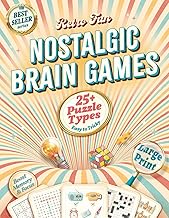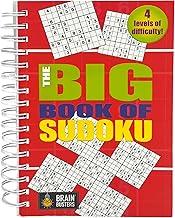Daily Brain Teasers: Your Secret Weapon for Peak Cognitive Performance
Do you ever feel like your brain is running on low battery? In our fast-paced world, staying sharp, focused, and mentally agile isn’t just a luxury – it’s a necessity. Just as physical exercise keeps your body fit, daily brain teasers are the ultimate workout for your mind, unlocking its full potential and paving the way for peak cognitive performance.
This comprehensive guide will explore the science behind daily brain training, introduce you to a variety of engaging exercises, and show you exactly how to integrate them into your routine to boost your memory, problem-solving skills, and overall mental well-being.
Why Your Brain Needs Daily Workouts
Think of your brain not as a static organ, but as a dynamic, adaptable supercomputer. To keep it running optimally, it needs regular challenges that push it beyond its comfort zone. Here’s why a daily dose of mental gymnastics is crucial:
Neuroplasticity and Cognitive Reserve
Your brain has an amazing ability called neuroplasticity – it can reorganize itself, forming new neural connections and strengthening existing ones throughout your life. Engaging in new, challenging activities like brain teasers stimulates this process. This also contributes to building cognitive reserve, which is like a buffer that helps your brain function effectively even if some neural pathways are damaged, potentially delaying the onset or mitigating the impact of age-related cognitive decline.
Combating Cognitive Decline
As we age, it’s natural for some cognitive functions to slow down. However, consistent mental stimulation can help mitigate this decline. By regularly challenging your brain, you encourage the maintenance of neural pathways and support overall brain health, keeping your mind sharper for longer.
Boosting Focus and Problem-Solving
Daily brain teasers demand your full attention and require you to think critically to find solutions. This practice directly translates to improved concentration, enhanced analytical skills, and a more methodical approach to real-world problems. You’ll find yourself more adept at cutting through clutter and finding creative solutions.
The Science Behind Brain Teasers
It’s not just about “feeling smarter.” There’s solid scientific backing for why brain teasers are so effective:
Engaging Different Brain Regions
Different types of puzzles activate distinct areas of your brain. Logic puzzles might fire up your prefrontal cortex (for planning and decision-making), while word puzzles engage language centers. Regularly switching between puzzle types ensures a comprehensive workout for your entire brain.
Enhancing Memory and Processing Speed
Many brain teasers require you to hold information in your mind (working memory) and retrieve stored knowledge (long-term memory). The more you practice, the more efficient these processes become. Additionally, the need to quickly analyze information and formulate responses can significantly improve your mental processing speed.
Types of Brain Teasers for Every Mind
The beauty of brain teasers is their vast variety. There’s something for everyone, regardless of your preferences or current skill level. Here are some popular categories:
-
Logic Puzzles
These puzzles require deductive reasoning and systematic thinking. Examples include Sudoku, KenKen, Nonograms, and logic grid puzzles where you deduce relationships between different elements.
-
Word Puzzles
Perfect for language lovers, these challenge your vocabulary, spelling, and linguistic creativity. Think crosswords, anagrams, Scrabble, Boggle, Wordle, or even simple word searches.
-
Spatial Reasoning Puzzles
These exercises test your ability to visualize and manipulate objects in space. Jigsaw puzzles, Tangrams, Rubik’s Cubes, and even architectural drawing challenges fall into this category.
-
Memory Games
Specifically designed to improve recall and working memory. Examples include matching card games, “Simon Says” style apps, or simply trying to remember a list of items.
-
Riddles and Lateral Thinking
These require you to think outside the box and challenge assumptions. They are excellent for fostering creativity and non-linear problem-solving.
-
Math Challenges
From Kakuro and KenKen to mental arithmetic drills or complex equations, these sharpen your numerical fluency and logical computation skills.
How to Integrate Brain Teasers into Your Daily Routine
Making brain teasers a habit doesn’t require a huge time commitment. Consistency is key. Here’s how to seamlessly weave them into your day:
-
Start Small, Stay Consistent
Dedicate just 5-10 minutes each day. This could be during your morning coffee, commute, lunch break, or before bed. Short, regular sessions are more effective than infrequent, long ones.
-
Mix It Up
Don’t stick to just one type of puzzle. Rotate between logic, word, spatial, and memory games to ensure you’re challenging different cognitive functions.
-
Make It a Habit
Associate your brain teaser time with an existing daily routine. For example, “I’ll do a Sudoku while my coffee brews” or “I’ll solve a riddle during my afternoon slump.”
-
Track Your Progress (Optional)
Many brain training apps offer performance tracking. Seeing your scores improve can be a great motivator. Even without an app, simply noticing that you’re solving puzzles faster or tackling more complex ones is rewarding.
-
Don’t Be Afraid to Fail
Struggling means your brain is working hard and forming new connections. Embrace the challenge! The goal isn’t to get every answer right immediately, but to engage in the process of problem-solving.
-
Go Digital or Analog
Whether you prefer smartphone apps, online puzzle websites, traditional puzzle books, or even board games, choose what works best for your lifestyle and preferences.
Benefits Beyond Cognitive Skills
The advantages of daily brain training extend beyond just making you smarter. They can positively impact your overall well-being:
-
Stress Reduction
Engaging in a focused puzzle can be a form of mindful meditation, drawing your attention away from daily stressors and providing a mental break.
-
Improved Mood
The satisfaction of solving a challenging puzzle releases dopamine, a “feel-good” neurotransmitter, which can elevate your mood and boost self-esteem.
-
Enhanced Creativity
Lateral thinking puzzles, in particular, encourage you to break free from conventional thought patterns, fostering a more creative approach to all aspects of life.
Fact-Checking & Common Misconceptions
While brain teasers are incredibly beneficial, it’s important to have realistic expectations:
-
Are Brain Games a Magic Bullet?
No. While they significantly contribute to cognitive health, brain teasers are part of a larger picture. A balanced diet, regular physical exercise, sufficient sleep, social engagement, and lifelong learning are all crucial for optimal brain function.
-
Do They Prevent Alzheimer’s?
Current research suggests that engaging in mentally stimulating activities can help build cognitive reserve, which may delay the onset or reduce the severity of symptoms of neurodegenerative diseases like Alzheimer’s. However, brain teasers are not a cure or a guaranteed preventative measure. They are a powerful tool for maintaining brain health alongside other healthy lifestyle choices.
Conclusion
Incorporating daily brain teasers into your routine is a simple yet profoundly effective way to invest in your cognitive health and unlock your mind’s peak performance. From boosting memory and focus to enhancing problem-solving and even improving your mood, the benefits are undeniable.
So, why wait? Pick a puzzle, set aside a few minutes today, and start your journey toward a sharper, more agile, and resilient mind. Your brain will thank you for the workout!
Related Amazon Products

Retro Fun Nostalgic Brain Games for Seniors & Adults: A Large Print Puzzle Book with 60+ Memory Boosters, Word Games & Classic Challenges to Relive the 50s–90s

Big Book of Sudoku: Over 500 Puzzles & Solutions, Easy to Hard Puzzles for Adults (Brain Busters)
As an Amazon Associate I earn from qualifying purchases.








